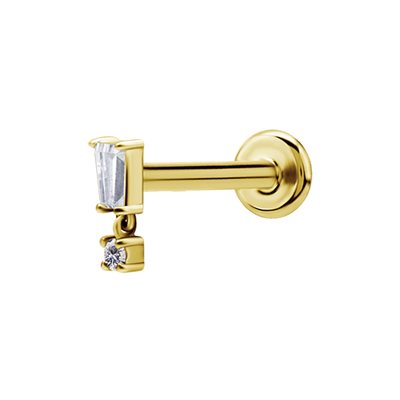- Homepage>
- Trinity Body Jewelry Online Boutique Canada>
- Body Piercing Jewelry Catalog>
- Flat back Labret Jewelry>
- 24k gold plated internal labret with jewelled baguette
24k gold plated internal labret with jewelled baguette
Suggested Retail price: CAD $56.03
- Main material : Surgical Steel (316L-ASTM F138)
- Secondary material : Same
- PVD Coating : 24k real yellow gold
- Gem type : Cubic zirconia
- Threading : Internal
- Classification : Labret
- Availability: In stock
Surgical Steel 316
SS316L is a surgical implant grade, which is the most used material for Body Jewelry. The two most common standards that apply to body jewelry made of steel are ASTM F138 and ISO 5832-1 which describe the qualities of steel for surgical implants.
The element in stainless steel that causes allergic reactions in some people is nickel. Polishing the jewelry to a mirror like luster results in a protective layer of chromium oxide, which reduces the release of the Nickel content into the tissue. Surgical Steel can be sterilized in an autoclave.
Check certificate and nickel release certificate for more info. You can also check the latest European directive regarding the use of nickel for body Jewelry.
MAGNETISM IN SURGICAL STEEL 316L
We had some returning questions regarding magnetism in Surgical Steel 316L. Some people still believe that if the steel is magnetic then it is not surgical steel. We would like to emphasize here one more time that this is not true. Stainless Steel 316L is a low-carbon form of 316 steel. Although it is non-magnetic when produced, it may become magnetic when worked.
Gold PVD Coated
24K real Gold is coated using a PVD (Physical Vapor Deposition) process and used on various metals.
The jewelry is coated in a heated chamber under high vacuum. Electric voltage applied will form a plasma in the chamber and the introduction of various gases produces an ion bombardment. This bombardment atomizes the cathode material (24k real Gold) into tiny substances which are deposited on the jewelry. The result is a hardened layer, which is biocompatible. It can be autoclaved.
Cubic Zirconia
Cubic Zirconia is currently the most popular substitute to a diamond because to the untrained eye they look identical. Cubic Zirconia or CZ as it is referred to is made from zirconium dioxide a different material than diamonds, which although a different chemical composition comes closer than any other gem to matching the characteristics of a diamond.
Natural CZ was first discovered in 1899 but it wasn’t until the late 70’s that man-made CZ first came into production for use in jewelry.
CZ on first impression looks just like a diamond, but under close inspection there are differences, it has a gravity of between 5.6 and 6.0 which means it’s 1.6 times the weight of a diamond. It has a hardness of 8 on the Mohs scale, a refraction index of 2.176 and a dispersive power of 0.060, which means that it’s not as hard as a diamond; it’s slightly less sparkly but displays more prismatic fire which means more colour sparkles within the gem.
Another point to note is that natural diamonds display impurities which CZ doesn’t. It’s also clear in colour which most diamonds aren’t, but they can be coloured by adding metal oxides in the production process. Unlike diamonds, CZ are good thermal insulators which mean they become warm but can’t withstand the same kind of heat a diamond can, which is one test that is used to distinguish diamonds from CZ. Caring for CZ is important because they are more brittle than diamonds and susceptible to wear and tear such as chipping and scratches over time.


